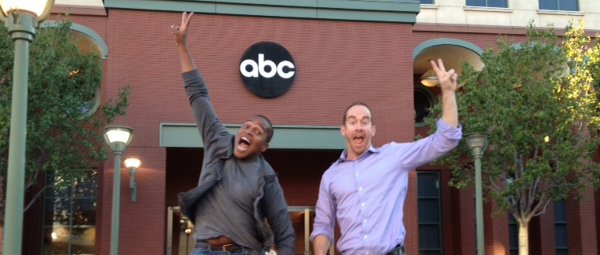GREETINGS FROM THE TRENCHES: How an indie filmmaking duo perfected the pitch that scored an ABC development deal

This photo is the way it happens in your dreams. In your dreams you are pitching a room full of enraptured execs, all leaning forward in their seats, nodding, smiling. The handshakes are firm and sincere. You go down the elevator, step out of the building and onto the sidewalk and the call comes in even before you set foot in the parking garage. You did it. They want it.
This photo is the way it happened to filmmakers Justin Wilson and Sheldon Candis. On August 8, they walked out of the ABC offices after their pitch meeting and the phone rang. They got the word that they got the deal.
The duo behind the Sundance hit LUV scored a development deal for A Slave in the White House, a 12-hour limited series, based on the best-selling book by Elizabeth Dowling Taylor, which chronicles the true story of Paul Jennings, a slave who worked as a personal valet for President James Madison, while at the same working behind the scenes as a subversive anti-slavery activist. “ABC was the very last pitch we did,” Wilson says, “by then we had honed it so well through repetition and practice.”
“We knew all our lines but we could improvise,” says Candis. “We hit our stride in the right place at the right time.”
Candis and Wilson are quick to credit their agents Greg Pedicin and Brandy Rivers at Gersh, pointing out that they’d never be in those rooms in the first place were it not for their agent’s phone pitching skills. “We found that really it’s really about how good your agents and representation are,” says Candis, a Project Involve Fellow. (Their managers are Jeremy Platt and Jelani Johnson.) “They’re the first line of attack. They’re the ones who get on the phone, and the first to pitch your idea. It’s all about how good they are at conveying your story.”
“Then we go door to door like encyclopedia salesmen,” Candis says.
By the time Candis and Wilson made those rounds pitching A Slave in the White House, they were veterans of the “water bottle tour” that happens once you have a big hit at a prestigious festival. “Coming out of Sundance, we went on 50-60 water bottle tour.” A screenwriter friend told Candis how it would go down, “You’ll make a movie and people will respond to that film and when you come back from Sundance, everyone in town is going to want to meet with you. They ‘ll offer you water, but they won’t offer you a job. You have to smile and press through it.”
“We did so many of those, all the nervousness issues or bad experiences we got out of our system,” says Candis. Even having racked up all that experience, Wilson still says pitching is ’the most emotional, mentally draining, nerve-wracking thing you can do.’ One of his tricks: practicing on an audience—random strangers, or in Wilson’s case, his wife Anne. Practice was key. They worked many months on the pitch with the books’ author, Taylor, and their reps before it got to anyone else.
Pitching with a partner, Wilson and Candis say, can be like performing a song. “It’s all about how engaging and entertaining can you be,” says Candis. “As much as you’re selling the story of Paul Jennings, you’re selling yourself,” Wilson says. “You have to inspire confidence in the people at the other end of the table.”
One of the duo’s mantras: “focus on what you can control.” They were in one meeting when they’d made a DVD teaser and 10 seconds after firing it up, an intern knocked on the door with coffee for all the execs. “It was the very top of our first pitch,” he says. “It just sucked all the air out of the room. You just have to keep going.“
Another tip: “You don’t want to give them everything in the pitch,” Wilson suggests. “Tease them without telling them the whole thing so they can ask questions. It helps to have producers who can intro you and set things up.”
Bottom line, says Candis is that “everyone wants to say no. You have to make it hard for them to say no.”
But long before the pitch and long after the deal, both say, perseverance is what matters most of all. Along the way, it was a series of champions—from the author of the book to Wilson’s father Gerald, who just before he died was able to see this success for his son—who helped them keep the faith throughout the 10 years it took them to become an overnight success.
By Pamela Miller / Website & Grants Manager